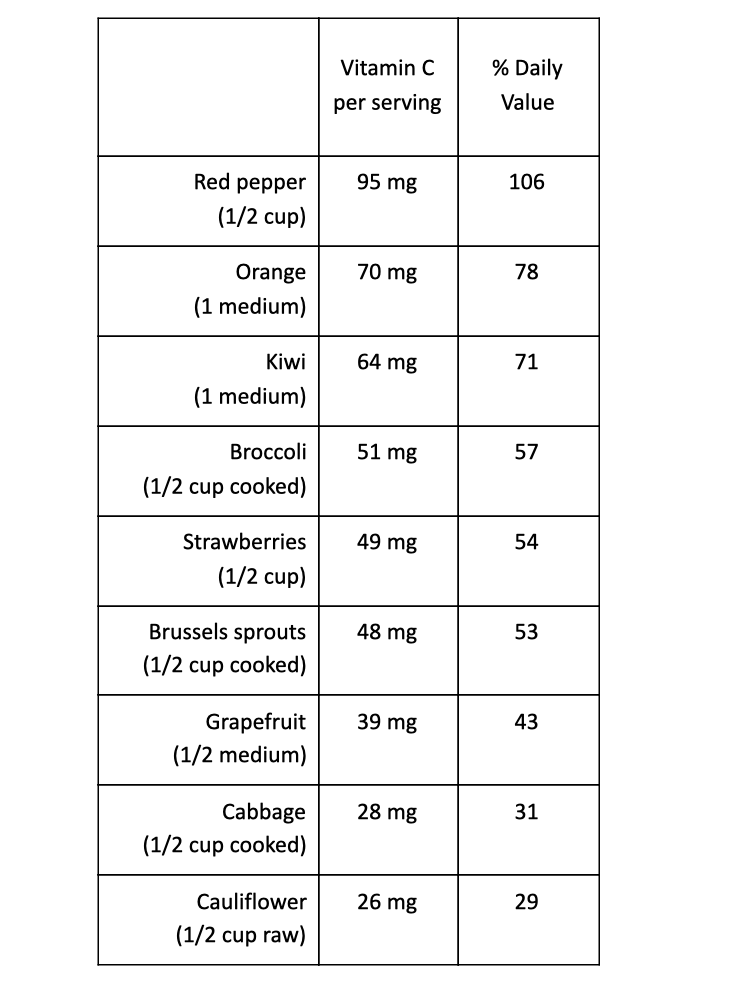Vitamin C gets tons of press for its ever growing list of benefits, and is especially counted on to boost our immunity to keep from being ill. But does it measure up to the hype?
Banking on a vitamin C health boost when we are rundown has stood the test of time, and for good reason.
Our body needs Vitamin C to heal infections and keep the immune system going strong.
We also need it to form muscle, cartilage, and blood vessels.
Vitamin C is an antioxidant, which means it is a nutrient that helps to protect our cells against the damage caused by toxic compounds called free radicals that can lead to diseases like cancer and heart disease.
How much vitamin C do we need?
Healthy adult men should get 90 mg of vitamin C every day, and adult women should be getting 75 mg.
The body is not able to make vitamin C on its own because it is water-soluble, which means that it dissolves in water and not stored very well within the body. So, we can either get it from eating vitamin C-rich foods or by taking a supplement.
The great news is that vitamin C is found in lots of different foods we typically eat every day, so if you eat a well-rounded variety of food most days, you should easily be getting enough without a problem.
Can vitamin C prevent a cold?
People have been loading up on vitamin C to help keep viruses at bay for ages. But can vitamin C truly fend off a pesky cold?
Research has been done to answer this very question, and surprisingly, it turns out not really.
A well-known 2013 study found that taking 200 mg or more of vitamin C every day did very little to prevent colds. Even taking as much as 3000 mg did not help either.
Vitamin C might not give you an edge when it comes to avoiding a cold, but interestingly, dosing up while under the weather can shorten the time you are ill.
The same study showed that a daily dose of 200 mg vitamin C actually shrank the amount of time the subjects felt symptoms when they were sick by 8%, a rough equivalent to one full day.

Should I take a vitamin C supplement?
Experts agree that it is better to get our vitamin C from a variety of healthy foods instead of a supplement because high vitamin C foods like fruits and vegetables also provide tons of other vitamins, minerals, and fiber that we also need.
But taking a daily supplement can be helpful for people with certain medical conditions like diabetes and high blood pressure.
Taking 1000 mg of vitamin C daily for only 30 days is shown to reduce glucose levels by 7.9 mg/dL in people with diabetes. Scientists believe this happens because of vitamin C’s ability to offset the harmful effects of free radicals in muscular tissue that can cause insulin resistance.
Vitamin C also promotes blood flow through our vessels by relaxing their inner muscles, leading to a reduction in blood pressure. Supplementing with 500 mg vitamin C for 8 weeks can drop systolic blood pressure by as much as 4.85 mmHg and diastolic blood pressure by 1.67 mmHg.
Foods that are surprisingly high in vitamin C
An orange is the first thing we think of when it comes to vitamin C, but plenty of other fruits and veggies are also excellent sources of vitamin C. Here is a short list of the top foods that deliver a high amount of vitamin C in just one serving. As you can see, you can reach your daily dose pretty quickly.

Vitamin C-Packed Red Cabbage and Orange Salad
This bright salad is bursting with crunchy sweetness and healing antioxidants thanks to heart-healthy ingredients like cabbage, oranges, and walnuts. Providing 134 mg of vitamin C per serving, you can deliciously reach your daily vitamin C requirement for the day.
Serves 2
Ingredients:
4 TBsp lemon juice
2 Tbsp maple syrup
1 Tbsp olive oil
1 small head of cabbage, cored and sliced thinly
2 oranges, peeled and cut into segments
½ cup walnuts, chopped
½ cup raisins (optional)
Instructions:
1) In a large bowl, whisk together the dressing ingredients (lemon juice, maple syrup, olive oil), and place the sliced cabbage and raisins in the bowl with the dressing and mix to combine. Refrigerate for 20 minutes to soften.
2) Before serving, add oranges and walnuts to the bowl with the cabbage and mix well.
Nutrition information per 1 serving: calories 250, fat 12 g, carb 37g, fiber 5g, sugar 27 g, protein 4 g.





